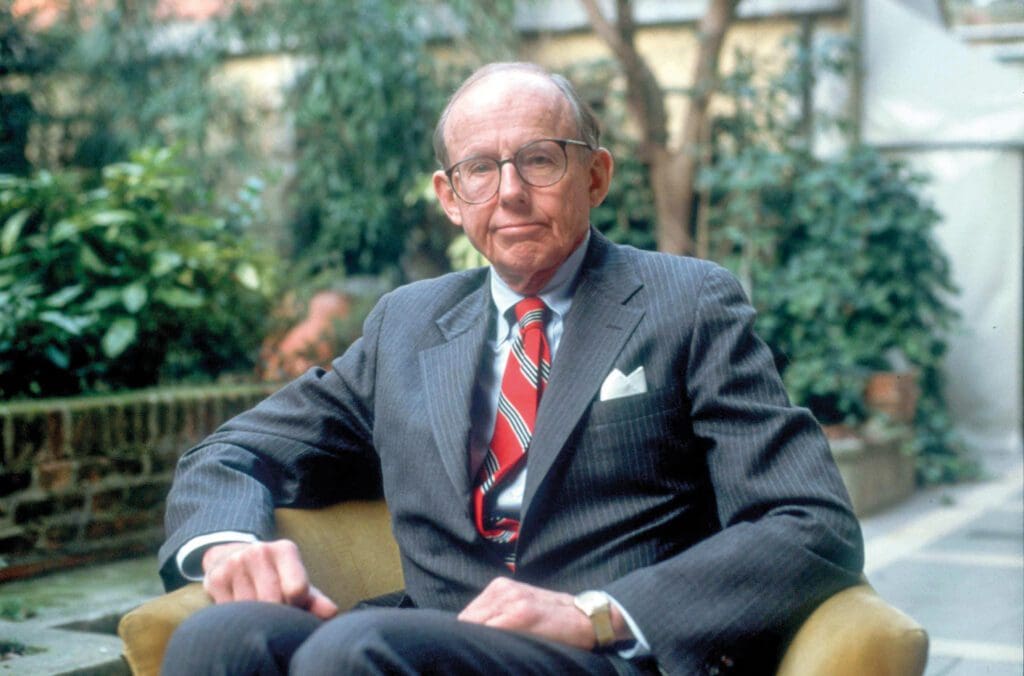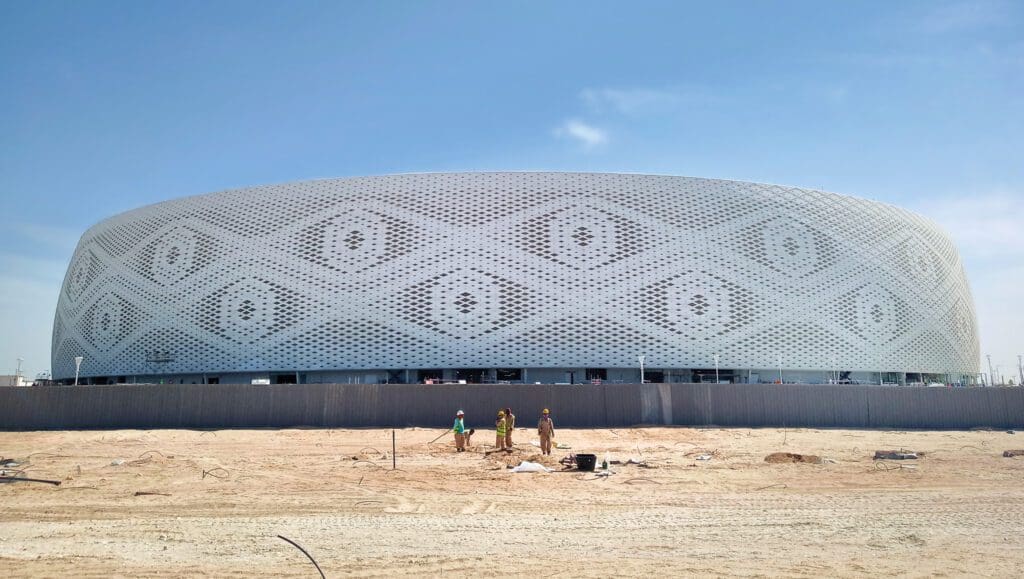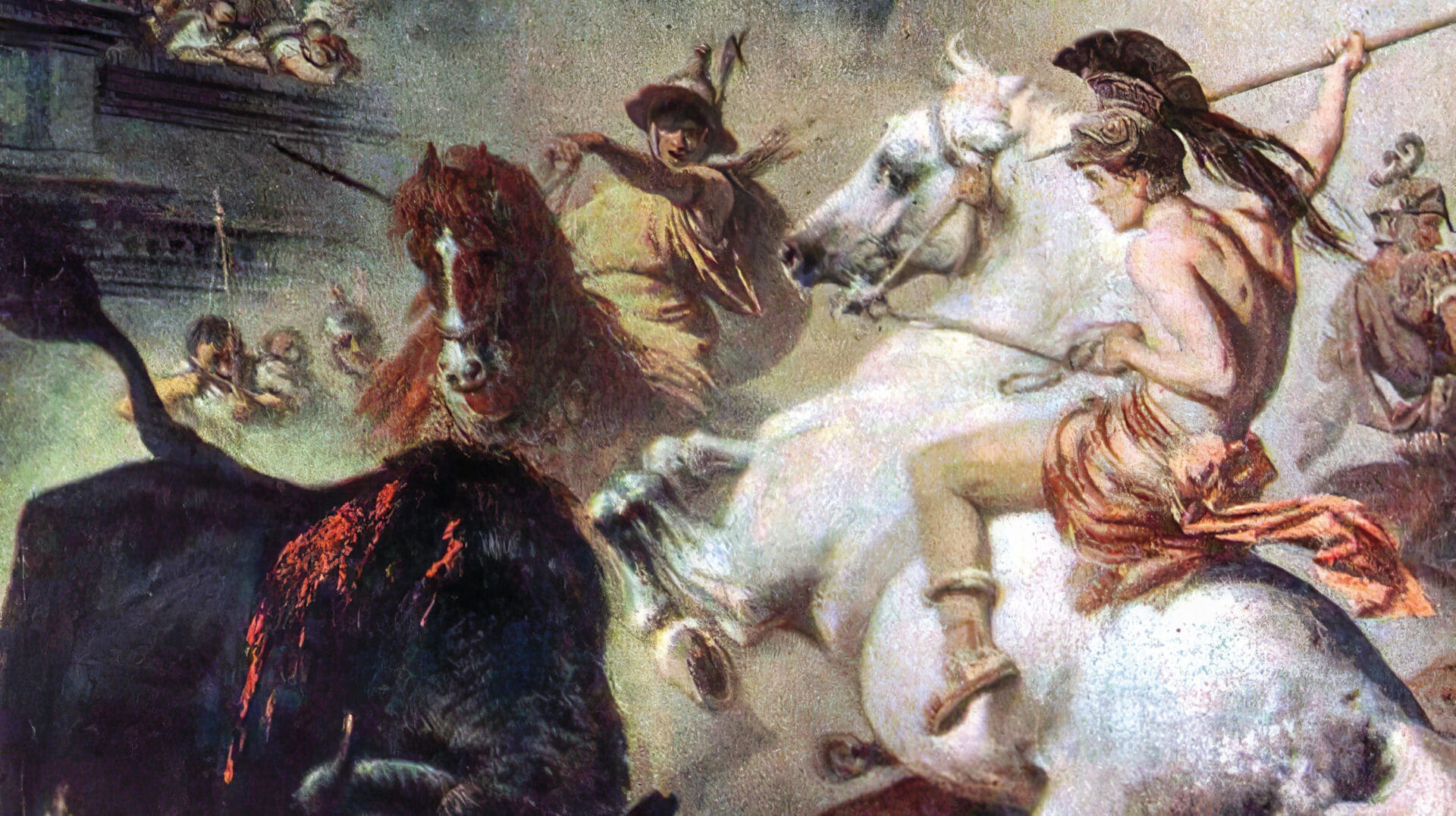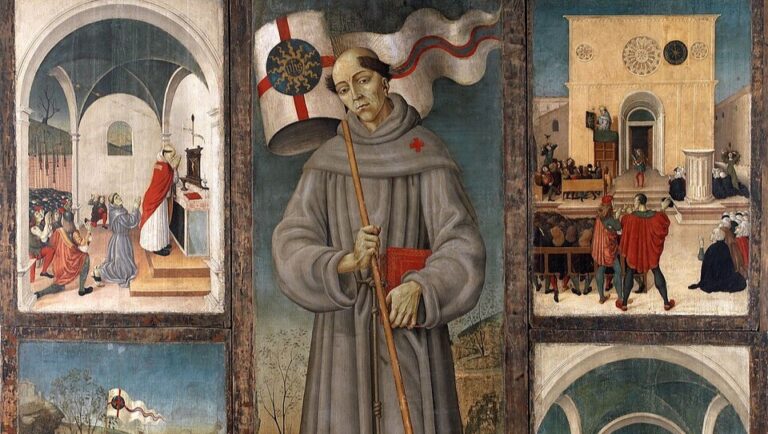This article was published in Vol. 3 No. 1 of the print edition.
Baal was one of the more important gods in the ancient pantheon, a pre-Christian deity worshipped across the Middle East. As a Semitic common noun, baal (Hebrew ba‘al) meant ‘owner or lord’.1 In some ancient civilizations like Carthage, Baal was worshipped as the supreme being associated with everything from the weather to fertility. The modern incarnation of such worship of a pagan supreme lord might be said to be Footbaal.
In the ancient setting of the Qatari desert in December 2022, Footbaal enjoyed its regular quadrennial celebration, with its High Priest, FIFA President Gianni Infantino declaring the 2022 World Cup ‘the greatest ever’. Like most creeds, Footbaal evokes a universalist totalizing vision. FIFA’s official commandment asserted ‘Football unites the world’.2 The slogan subliminally echoed a secular Western preoccupation with an open, borderless, post-Cold War world promoted relentlessly ever since Francis Fukuyama announced the end of history in 1992.3
The problem, however, is that this integrated world order is not dawning. And football, far from uniting the world, instead reflects its transformation into something very different, namely a growing clash of civilizational identities. If the analogy holds, in a curious way the month-long event in the uber-wealthy Gulf sheikhdom merely intimated the schismatic nature of this new secular faith. In particular, it reflected and magnified the state of the post-Western world disorder and what the American political scientist Samuel Huntington presciently described in 1996 as an inexorable clash of civilizations. Huntington observed that as the West weakened economically, demographically, and territorially compared with ‘challenger’ cultures like China, the Muslim world, Latin America, India, and Eurasia, so too would its hard and soft power.4
In the post-Cold War world, according to Huntington, civilizational identities would inform an evolving ‘pattern of cohesion, disintegration and conflict’. Inhabiting ‘a mirage of immortality’, a purblind West would fail to see that this brave new world was multi-civilizational.5 As they acquired Western technologies and wealth, while also securing their energy and manufacturing base, different civilizations came to resent the drive to ‘Westernize’ their societies.6 ‘Democratization’ was the euphemistic term for this form of Westernization. It sought to persuade non-Western civilizations to accept a universal progressive agenda, where supposedly shared liberal moral values of human rights and social justice prevail. Failure to align with this progressive institutional order was to be consigned to the outer darkness of impoverished pariahdom, like Afghanistan, Iraq, Cuba, Iran, and North Korea.

Despite the homogenizing pretentions inherent in a universal moral order, the clash between the West and the Rest was immediately evident in Doha. Western commentators drew attention to Qatar’s abysmal human rights record. The country’s kalafa system that reduces migrant workers to little more than indentured labour, resulted in the cavalier sacrifice of an estimated 6,500 workers, mainly from Egypt, Pakistan, Philippines, and Nepal, to construct Qatar’s cavernous temples to footbaal.7 Meanwhile, Woke Western football pundits questioned the Arab kleptocracy’s treatment of women and the LGBTQ+ community, although only after the cheque for their commentating services had cleared the account of the Qatari sports channels.8
Burnishing their progressive credentials, the England team and seven other Western nations committed to wearing the ‘one love’ rainbow arm band. The commitment did not even survive the official kick off. FIFA’s stipulation that the display of political statements like wearing the armband would incur an automatic yellow card quickly saw off that principled commitment.9 The German team’s crass gesture of covering their mouths in protest at being prevented from wearing the ‘one love’ arm band received relentless mockery in the Qatari media. Commentators on the Alkass sports channel placed their hands over their mouths, barely concealing their mirth, while waving good- bye to Germany following its exit at the group stage.10

Meanwhile, the England team’s ‘taking the knee’ against racism looked even more vacuous, especially when they performed it against the United States, where the gesture originated but whose football team now studiously avoided it.11 Moral principles were notable only for their mutability in the post-modern Muslim paradise.
As the BBC commentary team achieved new heights of moral sententiousness, Infantino righteously denounced the West for ‘its staggering hypocrisy and racism’. For their past crimes against humanity, Europeans should be ‘apologizing for the next 3,000 years before starting to give lessons to people’.12 Yet on the eve of the opening ceremony, Infantino, engaged in a further round of weirdly contradictory pronouncements, declaring that he felt Qatari (possibly because he has a large second home there), Arabic, gay, disabled and like a migrant worker because he had been bullied at school for being ‘a foreigner’. The World Cup was about ‘pleasure and joy’. Fans only wanted to watch ‘ninety minutes without thinking about anything’, the FIFA president declared.13
Indeed, FIFA claimed it went to great lengths to keep political messaging out of the tournament. It even denied Volodymyr Zelensky’s request to share a message of world peace on the eve of the cup final, while Qatar, of course, maintained that it defended human rights ‘in its own way’.
‘Politics is, however, never far away from sport’
Politics is, however, never far away from sport. And political messaging was subliminally on display everywhere. It took the shape of largely non-Western crowds fanatically disporting their national allegiances. Japanese fans chanted Nippon and Banzai as their team reached the last sixteen, South Koreans fanatically declaimed Dae Han Min Guk, a homage to the Republic of Korea, whilst Argentine fans and their football team predictably chanted ‘Muchachos’, a song denouncing ‘the fucking English’ and the Falklands War they ‘don’t forget’.14
As fancied European teams fell by the wayside and England predictably choked, the Rest rose in the shape of Argentina, Japan, which defeated the once mighty Germans 2–1, and, of course, plucky little Morocco. Morocco, in fact, served as a proxy for the Muslim world in general and Qatar in particular. The North African kingdom and the desert sheikdom share close cultural and business ties. Every Moroccan game was a home tie, with its fans screaming and whistling incessantly to unsettle their opponents, rather successfully, as their unlikely victory over Portugal demonstrated. Less widely acknowledged was the widespread display of the Palestinian flag at Moroccan games. Whilst the Western media chose to ignore such obvious political statements, Qatar’s state-owned international broadcaster Al Jazeera regularly hosted broadcasts from the Gaza Strip where Hamas supporters celebrated every Moroccan goal.15
As Huntington noted in The Clash of Civilizations, civilizational affiliations are not eroded by globalizing and cosmopolitan forces but are instead exacerbated by them. In the borderless post-Cold War world, large migrant communities increasingly identify with different civilizations. In such conflicted cultural circumstances, previously coherent nation-states become ‘cleft’, as minority populations and their host country find that ‘the forces of repulsion drive them apart and they gravitate toward civilizational magnets in other societies’.16 As a result of uncontrolled migration flows such cleavages have become a familiar demographic feature of European and American states.
During the World Cup the ‘cleft’ character of Western Europe became all too apparent.17 After much fancied Belgium lost to Morocco, Brussels experienced several nights of rioting in the city that hosts a population of 40 per cent Muslim migrants. Riots also broke out in Antwerp and Rotterdam.18 After France defeated Morocco in the semi-final several days later, rioting again broke out in Brussels, as well as in Paris and Montpellier, where an angry mob assaulted a car disporting a French flag and at least one person died.19 Yet, somewhat ironically, as the cup final whistle blew at the end of 120 minutes, the French team consisted of only one native European, the ageing goalkeeper Hugo Lloris. The rest of his teammates on the field hailed from Francophone Africa or were sons of migrant families from the Parisian banlieues, home also to many migrant rioters.
In these circumstances of burgeoning greater civilizational identities, all too evident in Qatar, Huntington wrote that states may become ‘torn’. A torn state once possessed a single predominant culture placing it in one civilization, but its leaders want ‘to shift to another’.20 In such societies an elite chooses an identity contrary to the inclinations and attachments of the masses. This is evidently not true of the Arab world or of China, but it has become an all too apparent feature of Western civilization and was very much in evidence in the Qatar heat where its punditry’s embrace of Woke multicultural values clashed with the instincts and beliefs of its masses huddled in their homes, bars, cafes, and public houses. Political elites have at various times attempted to disavow their cultural heritage and shift the identity of their country from one civilization to another. In no case to date have they succeeded. Instead, they have created schizophrenic, torn countries. In an era of civilizational clashes, Woke multiculturalism endeavours to create a country of many civilizations, which is to say a country not belonging to any civilization and lacking a cultural core.
‘Multiculturalism at home threatens the United States and the West’, Huntington observed. At the same time, ‘universalism abroad threatens the West and the world’. Both deny the uniqueness of Western culture. ‘The global monoculturalists want to make the world like America. The domestic multiculturalists want to make America like the world’.21
In the deepening clash of civilizations, Europe and America would hang together or hang separately. The World Cup in Qatar was where England but not the United States took the knee, and where multimillionaire soccer pundit Garry Neville compared the treatment of striking nurses, railwaymen, and postal workers to that of migrant workers in Qatar, whilst also receiving a nice little earner from beIN, Qatar’s state-owned sports channels.22 Meanwhile, Belgian police investigate progressive socialist European MEPs concealing suitcases stuffed with euros courtesy of Qatar for supporting its global sporting endeavours.23 Such cumulative dissonance intimates a West collapsing under the weight of its own hypocrisy and performative contradictions.
‘In an era of civilizational clashes, Woke multiculturalism endeavours to create a country of many civilizations’
Yet perhaps, ultimately, to adapt what the Italian semiologist Umberto Eco wrote of an earlier World Cup, there really is no need to ask ourselves why the devotional spectacle in the desert has so morbidly captured the attention of the global public and the devotion of the mass media. ‘From the famous story of how a comedy by Terence played to an empty house because there was a trained bear show elsewhere, and the acute observation of Roman emperors about the usefulness of circuses, to the shrewd use that dictatorships have always made of great competitive events’, it is clear, that the masses prefer soccer to strikes or the latest rise in the price of everything.24
Sports debate is a useful substitute for political debate. Instead of judging the inept and vanishing Rishi Sunak you discuss the job done by Gareth Southgate or Didier Deschamps. Instead of criticizing the record of the Conservative Party or Emmanuel Macron you assess the record of the players. Instead of worrying about energy prices and the war in Ukraine, you ask if the final game will be decided by chance, athletic prowess, or by bribery, corruption, and diplomatic alchemy. Talk about soccer does not oblige you to intervene personally, because you are talking about something outside the area of the speaker’s power. For the male and female fan, Eco sagely noted, ‘it’s like little girls playing ladies: a pedagogical game, which teaches you how to occupy your proper place’.25
Finally, in political circumstances like these, considering the conduct of the government and opposition is either traumatic or depressing. Faced with this choice, those who expose the World Cup in all its fake grandeur should perhaps be careful not to mar the pleasure taken in this quasi-sacred mystery play. This World Cup arrived like Santa Claus, and we are now left with the aftermath of energy crisis, war, and famine. No wonder Qatar, FIFA, and its EU dependents want to expand the number of teams and hold the event every three years.
NOTES
1 ‘Baal’, Encyclopaedia Britannica, www.britannica.com/topic/Baal-ancient-deity, accessed 4 January 2023.
2 FIFA, ‘Football Unites the World’, www.fifa.com/social-impact/campaigns/football-unites-the-world, accessed 4 December 2022.
3 Francis Fukuyama, The End of History and the Last Man (London: Allen Lane, 1992).
4 Samuel P. Huntington, The Clash of Civilizations and the Remaking of World Order (New York: Simon & Schuster, 1996).
5 Huntington, The Clash of Civilizations, 237.
6 See Deepak Lal, ‘Does Modernization Require Westernization?’, The Independent Review, 1/1 (Summer 2000), 5–24.
7 Kail Robinson, ‘What is the Kalafa System’, Council on Foreign Relations (18 November 2022), www.cfr.org/backgrounder/what-kafala-system.
8 ‘“Stop this Insufferable Virtue Signalling!” Viewers Accuse Gary Lineker and Alex Scott of “Hypocrisy” as They Give Impassioned Speeches about Qatar Human Rights Record—from Studio in Stadium’, Daily Mail (20 November 2022), www.dailymail.co.uk/news/article-11450047/Viewers-accuse-Gary-Lineker-Alex- Scott-hypocrisy-Qatar-human-rights-record.html.
9 Matt Lawton, Tom Roddy, and Paul Joyce, ‘England back down after FIFA’s Yellow Card Threat Over “One Love” Armband’, The Times (21 November 2022), www.thetimes.co.uk/article/england-in-stand-off-with-fifa-over-yellow-card-threat-for-wearing-one-love-armband-b8zlwft2w.
10 Martin Bellem, ‘Qatari TV Hosts Appear to Mock Germany’s Human Rights Gesture after World Cup Exit’, The Guardian (2 December 2022), www.theguardian.com/football/2022/dec/02/qatari-tv-hosts- appear-to-mock-germany-human-rights-gesture-world-cup; see also ‘Qatar TV Mocks Germany over World Cup Exit’, Dodo Reactions, YouTube, www.youtube.com/watch?v=Wqrhz75YrAA.
11 ‘World Cup 2022: England Take the Knee before Group B Clash with USA’, The Independent (26 November 2022), www.independent.co.uk/tv/sport/manchester-united-premier-league-bournemouth- v838a2614.
12 ‘World Cup 2022: FIFA Chief Gianni Infantino Hits out at Qatar Criticism Saying European Countries Should Instead “Be Apologising for the Next 3,000 Years”’, Sky News (19 November 2022), https://news.sky.com/story/fifa-chief-gianni-infantino-hits-out-at-qatar-criticism-saying-european-countries-should-instead-be-apologising-for-the-next-3-000-years-12750765.
13 Sean Ingle, ‘“I Feel Gay, Disabled … Like a Woman Too!”: Infantino Makes Bizarre Attack on Critics’, The Guardian (19 November 2022), www.theguardian.com/football/2022/nov/19/fifa-gianni-infantino-world-cup-qatar.
14 Ryan Kelly, ‘Argentina “Muchachos” Chant: Lyrics and Meaning of Lionel Messi’s Favourite World Cup Song’, Goal (18 December 2022), www.goal.com/en-gb/news/argentina-muchachos-chant-lyrics-meaning-lionel-messi-favourite-world-cup-song/ blte091925b91d22644.
15 Dima Khatib, ‘World Cup 2022: Palestine Beats Israel on Football’s Big Stage’, Al Jazeera (7 December 2022), www.aljazeera.com/opinions/2022/12/7/fifa-world-cup-palestine-1-israel-0.
16 Huntington, The Clash of Civilizations, 197.
17 Huntington, The Clash of Civilizations, 137.
18 ‘Riots Erupt in Belgium and Netherlands after Morocco’s World Cup Win’, The Daily Telegraph (28 November 2022), www.telegraph.co.uk/world-news/2022/11/28/riots-belgium-dutch-cities-morocco-win-world-cup-2022/.
19 Jon Henley, ‘Boy Killed in Montpellier amid Violence after France–Morocco Game’, The Guardian (15 December 2022), www.theguardian.com/world/2022/dec/15/boy-killed-in-montpellier-amid-violence-after-france-morocco-game.
20 Huntington, The Clash of Civilizations, 139–154.
21 Huntington, The Clash of Civilizations, 177.
22 David Churchill, ‘Outrage at Gary Neville’s World Cup Rant over Strikes Bringing UK to a Standstill: ITV Disowns Pundit’s Comparison of Rail Staff, Nurses and Ambulance Drivers with Qatar’s Migrant Workers’, Daily Mail (19 December 2022), www.dailymail.co.uk/sport/fifa-world-cup/article-11552275/ ITV-disowns-Gary-Nevilles-comparison-rail-staff-Qatar-migrant-workers-World-Cup-coverage.html.
23 Matina Stevis-Gridneff, Monika Pronczuk, Tariq Panja and Sarah Hurtes, ‘Bribery Case Cracks Open European Parliament—and Finds Hidden Cash’, The New York Times (15 December 2022), www.nytimes.com/2022/12/15/world/europe/qatar-european-parliament-bribery.html.
24 Umberto Eco, ‘The World Cup and Its Pomps’, in Travels in Hyper Reality (New York: A Harvest Book, 1973), 167–173.
25 Eco, Travels, 171.








